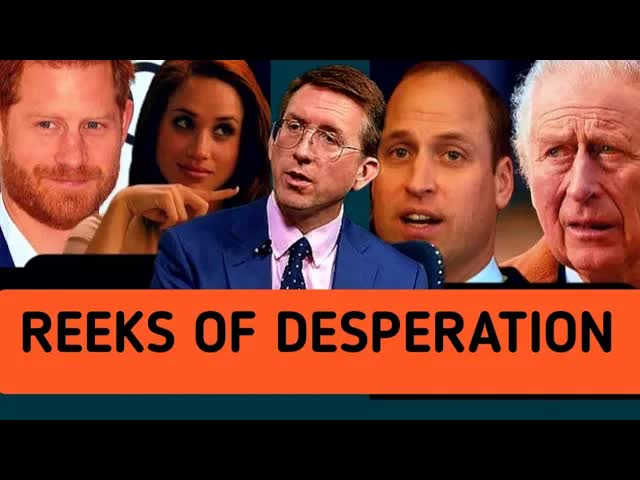In recent weeks, speculation has swirled around the Duke and Duchess of Sussex, fueled by claims from royal commentator Richard Eden.
He suggests that Harry and Meghan are pining for a reconciliation with the royal family, stirring up conversations across media platforms.
But is there any truth to these assertions, or are they merely wishful thinking?
Let’s dive deeper into this intriguing narrative.
Eden, a well-known figure in royal circles, has made some bold statements about the couple’s current state of mind.
He portrays them as individuals yearning for the comforts of their former royal lives, suggesting that they are not the independent icons they’ve become but rather lost souls seeking a return to the fold of the monarchy.
This picture he paints is one of longing, where Harry and Meghan are depicted as remorseful figures ready to abandon their American dream for the grey skies of Britain.
His narrative implies that their ventures into philanthropy and media are mere distractions, temporary diversions from what he believes is their true calling within the royal system.
Eden seems to suggest that their public endeavors lack genuine intent and instead serve as placeholders until they can reclaim their royal status.
This perspective raises questions: Are they truly unhappy with their current lifestyle, or is this just a convenient theory?
Looking at their life in California, it’s hard to reconcile Eden’s claims with the reality of Harry and Meghan’s situation.
Imagine trading the rigid protocols of royal life for sun-soaked beaches and the freedom of the West Coast.
The couple has embraced a new identity as entrepreneurs and philanthropists, launching Archwell, their nonprofit foundation aimed at fostering compassionate communities worldwide.
Their work reflects a genuine commitment to positive change, far removed from the ceremonial duties they once performed.
Moreover, they have ventured into the media landscape with lucrative deals with Spotify and Netflix, allowing them to produce content that resonates with their values.
By tackling topics like mental health, racial equality, and gender justice, they’re not just creating entertainment; they’re using their platform to spark meaningful conversations.
This newfound autonomy has transformed their lives, enabling them to explore passions that were previously stifled.
As parents, Harry and Meghan are also relishing the opportunity to provide their children with a semblance of normalcy.
Swapping royal engagements for family barbecues and quiet nights in, they seem to have found joy in the simple pleasures of life.
Given their flourishing new existence, Eden’s assertion that they long to return to royal duties appears increasingly unfounded.
To further understand the Sussexes’ decision to step back, we must consider the complexities of royal life.
The monarchy is an institution steeped in tradition, often resembling a gilded cage—beautiful yet constraining.
Harry and Meghan faced immense pressure within this environment, battling relentless media scrutiny and familial expectations that took a toll on their mental health.
For Harry, who was born into this world, the pressures were familiar, but for Meghan, the transition was particularly challenging.
Once an accomplished actress and humanitarian, her identity became largely defined by her title as Duchess of Sussex, which came with its own set of limitations.
The couple’s strained relationships with other royals contributed to their feelings of isolation, ultimately leading to their departure from royal duties.
The royal family operates in a sphere where personal and professional lines blur, often resulting in misunderstandings and conflicts.
For Harry and Meghan, this environment felt suffocating.
They sought a life where they could make authentic choices, free from the constraints of royal obligation.
In California, they’ve discovered that freedom, allowing them to champion causes they care about without the limitations they once faced.
With this context in mind, it’s essential to critically assess Eden’s claims.
He suggests that Harry and Meghan are desperate to reconcile with the royal family, yet their public statements reflect relief and happiness since stepping back.
Their thriving careers as philanthropists and media figures indicate a couple actively carving out a new path, rather than yearning for their past roles.
Eden’s assertion that they miss the familiarity of royal life is also questionable.
The couple has openly discussed the challenges they faced under the relentless spotlight of royal duties.
Their decision to leave was motivated by a desire for a more peaceful existence, a stark contrast to the pressures they endured.
Lastly, Eden posits that the Sussexes are eager to rejoin the power dynamics of the royal family.
However, Harry and Meghan have consistently expressed their disinterest in palace intrigues, focusing instead on their family and their mission to create positive change in the world.
The evidence overwhelmingly contradicts Richard Eden’s claims.
The Duke and Duchess of Sussex have not only distanced themselves physically from royal life but have also moved on emotionally and psychologically.
Their vibrant new existence in California serves as a testament to their commitment to living authentically, proving that they are more than capable of thriving outside the confines of the monarchy.
As the royal family navigates its own challenges, it’s clear that Harry and Meghan have charted a different course, one that prioritizes their values and aspirations over traditional expectations.
It’s time to acknowledge this shift and recognize that the Sussexes have indeed moved on, leaving behind a life that no longer serves them.
